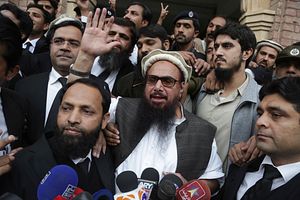The electoral significance of Islamist groups in Pakistan has always remained fundamental when it comes to elections in the country. Regardless of these groups’ small presence in the Parliament, their street power and ability to influence public opinion have always acted as a source of leverage when it comes to forcing politicians into compromises. The upcoming general election is likely to empower Islamist groups in Pakistan, irrespective of which political party wins the election, hence tightening their hold over the society and polity.
Arguably, the upcoming election in Pakistan appears to offer an ideal space to radical Islamist groups—space they may have lost after the formation of the National Action Plan (NAP), a 20-point agenda to fight extremism in Pakistan. This approach to tackling extremism, which the state was able to build after the Army Public School massacre in 2014, created enough space for decision-makers that Islamists in the country were isolated, and also resulted in some big policy decisions that otherwise may not have been possible.
For more than a year after the 2014 attack, the state forcefully implemented the approach, dealing with an imminent need to uproot Islamist militancy from the Pakistani society. The policy development process, backed by all political parties and major state institutions, showed resolve in sending a clear message to Islamist groups with sectarian aims that their days of terrorizing the state were over. Moreover, the state also appeared willing to use the Army Public School incident to finally put an end to the autonomy that thousands of madrassas have enjoyed in Pakistan in the form of operating beyond the state’s control.
The state’s intent to implement major policy measures seemed promising. However, the underlying political and institutional interests of the ruling elite came into conflict with the narrative that emerged after the NAP’s formation. Public support was lost within two years, for the country’s civilian and the military elite couldn’t agree to a single policy when it came to taking action against domestically based Islamist groups, reviewing the country’s security policy, and above all, the elected government’s desire to extend its control over foreign affairs.
The time between 2015 and 2017 saw various state institutions employing local Islamist groups against each other, which not only undermined the post-2014 narrative against extremism but also offered space to Islamists to regain their lost space. During the last two years, Islamist groups have not only reclaimed their lost radical constituencies in the country, but also appear to have destroyed any relevancy of a narrative that talks about a liberal, progressive, and tolerant Pakistan.
Over the past year alone, Islamist groups armed with a radical narrative of Islam being under threat due to the government’s pro-West policies have managed to force the state into taking back some of the legislation that does not serve their militaristic causes. On the other hand, Islamist groups have forced the government into passing legislation solely relying on the power of their vicious narrative, which draws thousands of people into the streets at a moment’s notice. This has set a dangerous precedent for political parties, whose ability to govern has come directly under threat. The next government that is likely to take office in the next few months will not only have to deal with the military to ensure that it has adequate governance space, but will also remain at the mercy of Islamist groups to safeguard its survival.
The ongoing election campaign in Pakistan has seen all major political parties appealing to various Islamist groups for their support. Arguably this shows that political parties do not feel confident about their ability to win an election without the support of Islamist groups — let alone their ability to govern the country with their disapproval and hostility. Unfortunately, this doesn’t bode well for Pakistan’s democratic future. Over the course of next few years, it may become virtually impossible to get anything done in a country where nothing moves without the blessings of radical Islamists, who only have a dark vision for the future of Pakistan.

































